Questions Worth Pondering | Participants Respond
Hear participants' responses to the questions for reflection from each LWF region.
Question from the Nordic region
- © LWF/Ratna Leak
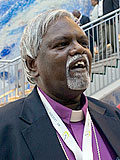
In today’s world, how do we Lutherans witness to God, the giver of all good gifts?
From an Indian perspective, God’s grace is a free gift without any conditions. The receiver of this gift is conferred with responsibilities. The God of grace who listens to the cry of the people in their suffering challenges us to respond. And in these responses the grace becomes manifest both to the one who receives and the one who shares. Christian witness in communion is a continuous process of receiving and sharing. I believe that it is God’s free gift that not only restores one’s faith, but also sustains one to be involved in ensuring the well-being, the harmonious living of all.
Rev. Dr Busi Suneel Bhanu, President of the Andhra Evangelical Lutheran Church
Question from the Asian region
- © LWF/ Ratna Leak
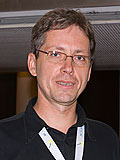
How do you cope with the knowledge that millions are starving?
“To have is to share.” Knowing millions are starving challenges me personally, and as a church we cannot afford to be silent. Every person needs to be responsible for their own actions. One needs to know that their actions affect others. All of God’s creation is forgetting the need for mutual dependence. The affluent continue to consume more than they need. Our impact on the environment is enormously startling. As a church, we need to condemn this as sin. The global Lutheran communion is called to rediscover one’s link with all life on earth. Think globally and act locally, with responsibility.
Rev. Kilian Dörr, Evangelical Church of the Augsburg Confession in Romania
Question from the Central Eastern and Central Western Europe regions
- © LWF/Ratna Leak
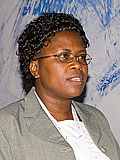
Where do we see in our everyday lives the new opportunities that God creates?
“Morning by morning new mercies I see.” Every day is a new day – a new life given to all creation by God’s mercy. Every day is unique; it brings joy to some and sorrow to others. Some face death from illness, natural catastrophe and poverty and at the same time some are healed from their illness. Some are saved from tidal waves of a tsunami and some blessed with more than their wants.
God creates new opportunities and new realities in midst of this joy and sorrow. One needs to believe that there is a new ray of hope in every situation that one faces. New opportunities must be seen through the eyes of faith, not as something that is remote but as something within oneself. If God is the creator, we are God’s co-creators, creators of new and better opportunities for us and for others. Make the world a better place to live in.
Rev. Elieshi Ayo Mungure, Evangelical Lutheran Church in Tanzania
Question from the African region
- © LWF/Ratna Leak
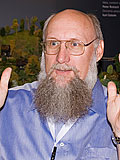
What should be the role of the church in the context of the insufficient daily bread versus the over-sufficiency enjoyed by a few?
On one hand over 1 billion people have not enough to live and on the other hand many other people have too much in life. Ironically both the lives of the hungry and the lives of the affluent have their humanity at risk – the insufficient [are at risk] of chronic malnutrition and poverty, the over-sufficient [are at risk] by turning a blind eye to the insufficient, which robs them of their humanity. To avoid this risk one needs to see what God’s word says. It is crystal clear about God’s will that there should be enough for all.
God’s providence is directed toward the well-being of all God’s creation. But instead of defending food as a human right, we have let it become a commodity. The churches in North America, together with the other churches, need to understand that it is not only a matter of charity in times of food emergency but that also there is need for advocacy to have a more just distribution of food. The Lutheran Church should declare ending hunger as a matter of status confessionis, a matter core to confessing the Christian faith today.
Rev. Dr Craig Nessan, Evangelical Lutheran Church in America
Question from the Latin American and Caribbean region
- © LWF/ Ratna Leak
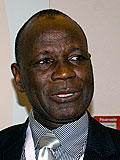
Did the approaches of the contextual theologies coming from the Latin American continent, especially regarding the search for justice and fair distribution of “bread,” influence the theologies developed in your region?
Liberation theologies that evolved, still evolving and will continue to evolve from different countries are identical in terms of the claim for one’s integrity and justice. Yet they are different because they are contextual. Every liberation theology is unique with its roots and intentions that influence similar theologies that evolve in other countries.
The contextual theologies compel one to reread the Scriptures in terms of one’s own context of liberation and to question the structures of injustice. Jesus displayed the same in his life on Earth. Since our life is shaped by Scripture, as followers of Christ, we are called to break the fetters of oppression. In doing this one affirms that Jesus, the Living Bread, is truly incarnate.
Archbishop Nemuel Babba, The Lutheran Church of Christ in Nigeria
Questions from the North American region
- © LWF/Timothy Melvyn
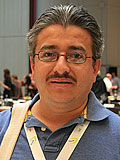
People who regularly eat their fill and who experience no shortage of the finer things in life sometimes confess that they feel “empty.” They say that they are hungry for something more, thirsty for something they do not fully understand, yearning for something they do not know what. What is this bread of life that people yearn for that is not provided by “loaves?”
Feeling happy in adverse situations, joy in the midst of poverty – not uncommon in many places – is what draws attention to those who visit Columbia. Our neighborhoods are plagued with extreme poverty, especially in our capital city, Bogotá, but there are people who smile despite their deprivation of comforts.
On the other hand, there are people who feel “empty” despite having plenty of tasty food and the comfort of luxury. This “emptiness” must be confronted with the Word of God that, “One does not live by bread alone, but by every word that comes from the mouth of God” (Matt 4:4)
The temptation of enjoying “abundance” at the expense of the basic needs of the poor is unethical. Feeling happy through sharing out of one’s own free will must be spontaneous. Solidarity with those who yearn for bread – physical or spiritual – and faith and hope in God are the spiritual blessings with which one needs to be "nourished."
Bishop Eduardo Martínez, Evangelical Lutheran Church of Colombia
